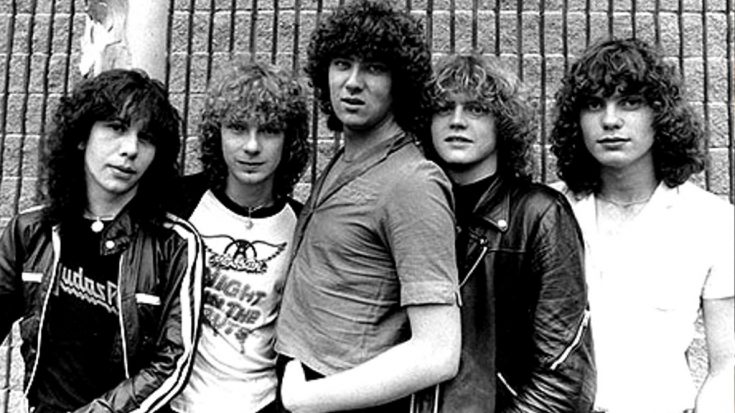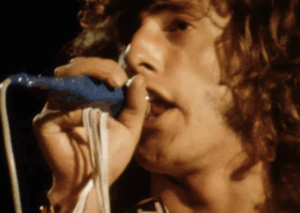All The Shocking Moments Happened with Def Leppard

Photo Credit: bestrockmusical.wordpress.com
Many people consider Def Leppard to be one of the most influential hard rock bands of the 1980s. Despite being founded in the late 1970s, they produced successful songs and kept improving their sound well into the 1990s. Emerging from the wave of British heavy metal that launched bands like Black Sabbath and Judas Priest to global success, Def Leppard mixed thunderous drums, heavy guitar riffs, soaring vocals, catchy pop hooks, and a radio-friendly attitude. Their albums like Hysteria and Pyromania helped to establish a new generation of melodic rock bands, thanks to the unique voice of Joe Elliott, the guitar work of Steve Clark, and the production prowess of Robert “Mutt” Lange. Def Leppard has persevered as a rock music juggernaut despite numerous setbacks.
Def Leppard’s Formation Involved Key Members Switching Bands
Def Leppard rose to global fame in the 1980s, quickly finding success after forming in 1977 in Sheffield, England. Their journey to stardom, however, was built on a mix of chance and bold ambition. As the Rock and Roll Hall of Fame explains, Joe Elliott, a teenager and aspiring singer, missed his bus one day and met Pete Willis, another teen with dreams of rock stardom. They instantly connected, and soon Willis introduced Elliott to his band, Atomic Mass, which included bassist Rick Savage. However, Elliott had his own vision for a band blending heavy metal with pop hooks, and his new project became Def Leppard. Willis and Savage left Atomic Mass, joining Elliott, and with the addition of guitarist Steve Clark, they recorded their first EP, Getcha Rocks Off, in 1978.
The Surprising Story Behind Def Leppard’s Union Jack Style
The Union Jack, the national flag of the United Kingdom, has been a symbol of British pride for many, and two famous acts have adopted it as a key part of their image: Ginger Spice from the Spice Girls and Def Leppard. However, the band’s use of the flag wasn’t just about showing national pride; it happened by accident and dates back to the early days of their career.
As singer Joe Elliott recalled in a SiriusXM interview, drummer Rick Allen wore Union Jack shorts in 1981, but no one paid much attention since they were hidden behind the drum kit. Then, in the 1983 video for “Photograph,” both Allen and Elliott wore Union Jack gear. Elliott had just 25 pounds for an outfit and ended up buying a Union Jack shirt for 7.99. After that, fans began showing up to concerts wearing Union Jack clothes, prompting the band to create similar shirts for merchandise. “We thought it was hilarious, all these Americans buying this Union Jack shirt, and like 200 years ago they’d be kicking us out of the country,” Elliott said.
Def Leppard Found Fame in America Before the U.K.
Though Def Leppard is undeniably a British band, their success initially took off across the Atlantic in the United States. Despite early efforts in their homeland, including hits like “Photograph” and “Rock of Ages,” none of their singles cracked the top 40 on the U.K. charts, and their first two albums didn’t make much of an impact.
However, their fortunes changed when they recorded the video for “Photograph,” the lead single from their third album Pyromania. As Joe Elliott shared in a SiriusXM interview, the band’s limited budget made the video a challenge, but it was a game-changer in America. “It went through the roof because of MTV,” Elliott explained. As the cable network gained popularity, Def Leppard’s exposure skyrocketed, propelling “Photograph” to No. 1 on Billboard’s rock chart. Success in the U.S. eventually led to recognition back home, with their first U.K. hit, “Animal,” arriving in 1987.
The Mystery Behind Def Leppard’s German Opening in “Rock of Ages”
If you’ve ever wondered about the German phrase at the start of Def Leppard’s “Rock of Ages,” you’re not alone. The line, “Gunter, gleiben, glauten, globen,” might sound like it means something, but according to the Def Leppard FAQ, it doesn’t really mean anything at all. As Joe Elliott explained, while recording the song, producer Robert “Mutt” Lange got tired of doing the typical 1-2-3-4 countdown and started making up funny nonsense phrases to keep things lighthearted. This quirky bit of gibberish went on to become iconic, even resurfacing years later in The Offspring’s “Pretty Fly (For a White Guy).” For fans trying to decipher the words, there’s no deeper meaning—just a bit of studio fun.
Rick Allen: Def Leppard’s Drummer Who Overcame the Loss of His Arm
On December 31, 1984, during a holiday break, Def Leppard drummer Rick Allen was involved in a car crash that would change his life forever. While driving his Corvette Stingray near Sheffield, England, he lost control and crashed into a stone wall, flipping the car. Despite wearing a seatbelt, Allen was ejected and found that his left arm had been severed. After an intense effort to reattach the arm, complications led to its amputation. But Allen didn’t give up. While still recovering in the hospital, he began brainstorming ways to keep playing drums. Using his feet and custom-made equipment, he created a drum kit that allowed him to continue performing.
Def Leppard Scraps the First Version of Hysteria to Create a Landmark Album
Def Leppard’s Hysteria (1987) is a defining album of the 1980s, blending ’70s British metal with the polished sound of ’80s hair metal. However, the album’s iconic sound almost didn’t happen. Initially, producer Robert “Mutt” Lange, who worked on High ‘n’ Dry and Pyromania, was set to produce, but after exhaustion from working on the Cars’ Heartbeat City, he stepped away. Management hired Jim Steinman as a replacement, but his theatrical style didn’t fit the band’s needs. After eight incomplete songs and mounting issues, Def Leppard dismissed Steinman and waited for Lange’s return. The final version of Hysteria became one of the band’s most successful albums, selling over 20 million copies.
Def Leppard Set Ambitious Goals with Hysteria to Match Thriller’s Success
After the massive success of Pyromania (1983), which featured six top 40 rock hits, Def Leppard and producer Robert “Mutt” Lange set even higher expectations for their follow-up album, Hysteria (1987). “Mutt said: ‘Let’s make a rock version of Thriller — an album you can have seven singles off,” guitarist Phil Collen recalled (via Classic Rock). This “all-hits, no-filler” approach inspired them to create a groundbreaking record. Designer Andie Airfix, working during the transition from vinyl to compact discs, embraced this vision by crafting an album cover designed for nine potential singles. The nine sections of the cover were later used as artwork for Hysteria’s commercial singles, such as “Animal,” “Pour Some Sugar on Me,” and “Love Bites.”
Def Leppard vs. Krokus: A Tour Gone Wrong
Def Leppard made waves in the U.S. in 1983 with Pyromania, especially with the hit single “Photograph,” which dominated MTV. The band set out on tour, playing massive arenas across the country, and brought Swiss hard rockers Krokus along as the opening act. However, the tour quickly soured. According to Classic Rock, Krokus was told not to use the ramps and scaffolding on stage, which were reserved for singer Joe Elliott’s choreography. Despite the warning, Krokus’s singer Marc Storace mimicked Elliott’s moves, making it seem like Def Leppard was copying them. This led to tension, and Krokus’s manager, Butch Stone, boasted about the drama. A physical altercation broke out between Stone and Def Leppard’s Rick Allen, resulting in Krokus being removed from the tour.
The Tragic Reason Vivian Campbell Joined Def Leppard
Steve Clark was a founding member of Def Leppard, known for his powerful guitar work, but his battle with heavy drinking became a serious issue by the late 1980s. According to Phil Collen in his memoir Adrenalized (via Classic Rock), Clark was found unconscious in a Minneapolis bar, with a blood alcohol level of 0.59—well above the fatal level of 0.41 that led to Led Zeppelin’s John Bonham’s death. Despite rehab, Clark relapsed. In January 1991, while on a health break, Clark tragically passed away in his sleep. An autopsy confirmed his death was due to a mix of alcohol, codeine, and painkillers. In 1992, Def Leppard brought in Vivian Campbell, known for his work with Dio and Whitesnake, as their new guitarist.
The Secrets Behind Def Leppard’s Unique Stage Setup
During their Hysteria tour, Def Leppard kicked off their U.S. leg on October 1, 1987, with a groundbreaking concert format. The band performed on a stage set “in the round”—positioned in the center of the arena, with fans seated all around them. “We just did not know how it was going to work,” bassist Rick Savage shared with Billboard, admitting the challenge of constantly turning their backs to parts of the audience. The layout also created logistical challenges, including where groupies could hang out without a backstage. As Jim Urie, the band’s label contact, revealed, roadies would pick out girls from the crowd and take them beneath the stage. Getting the band onto the stage was tricky too—according to Phil Collen’s memoir Adrenalized (via Rolling Stone), they were hidden in laundry baskets and wheeled down the aisles.
Joe Elliott of Def Leppard Struggled with Losing His Voice
In January 2016, Def Leppard embarked on their Hysteria on the High Seas concert series aboard the MSC Divina cruise ship. But just before setting sail, lead singer Joe Elliott fell seriously ill with pneumonia and a severe cough—two conditions that were disastrous for a rock singer. “It totally destroyed my vocal cords, to the point where my throat doctor said to me, ‘If you weren’t you, I’d tell you to retire because this is never going to get better,'” Elliott shared with Express.
Despite the setbacks, Elliott joined the tour but couldn’t perform. He introduced the band while Vivian Campbell and Phil Collen stepped in to sing. For the remaining shows, the band brought in guest vocalists like Eric Martin from Mr. Big and Kip Winger from Winger. Elliott called it “the weirdest thing” to watch others sing his songs. Def Leppard canceled upcoming dates, and Elliott spent months rehabbing his voice, a process that took about 18 months to fully recover.
Def Leppard Set an Unbeatable World Record
Def Leppard is undeniably one of the most successful bands in rock history, selling over 100 million albums across four decades and placing them among giants like The Beatles and Michael Jackson. But the band also stands alone in another impressive category. In 1995, Def Leppard set a world record that remains unbeaten more than 25 years later.
To promote their Vault: Def Leppard Greatest Hits (1980–1985) album, the band staged a daring publicity stunt. On October 23, 1985, they played an acoustic show in Tangiers, Morocco, then flew to London for another performance, and finally jetted off to Vancouver for a third. This remarkable feat made Def Leppard the first band ever to perform three concerts on three different continents—Africa, Europe, and North America—within 24 hours.
Def Leppard Lost Some Early Members
Def Leppard’s journey began in the mid-1970s when a group of friends from Tapton School in Sheffield, England, formed a band called Atomic Mass. The lineup included bassist Rick Savage and drummer Tony Kenning, who brought in guitarist Pete Willis, and Willis later recruited Joe Elliott as the lead singer.
However, after just 15 months, Kenning was dismissed from the band. He explained it as a “lack of commitment” on his part. The new drummer was 15-year-old Rick Allen.
Pete Willis, the rhythm guitarist, didn’t last either. His alcohol issues affected his performance, creating tension with the band. “We had fisticuffs about it, and tears,” said Elliott. After giving Willis numerous chances, the band replaced him with Phil Collen in 1982.
What’s a Def Leppard Anyway?
The name “Def Leppard” stands out as both memorable and playfully metal, thanks to its bold misspelling. Joe Elliott, the band’s singer, came up with it while creating rock-inspired posters. “Joe used to make posters up for bands whilst at school and started making up band names and then making posters for them,” said the group’s first drummer, Tony Kenning. One of the names on those posters was “Deaf Leopard,” which Kenning shared with the band. “We thought the name was pretty cool and later I suggested changing the spelling to ‘Def Leppard,'” Kenning recalled.
Despite its resemblance to Led Zeppelin, Elliott insists it was purely accidental. “We didn’t notice that it looked like Led Zeppelin. Whoops!” he said.
The Unexpected Origins of “Pour Some Sugar on Me”
“Pour Some Sugar on Me” became a massive hit for Def Leppard in 1987, reaching No. 2 on the Hot 100. It perfectly captured the shift in pop music at the time, blending arena rock and metal with a touch of rap influence. Inspired by Run-DMC and Aerosmith’s collaboration on “Walk This Way,” Def Leppard decided to try their own hand at merging rock and rap. “When we did ‘Pour Some Sugar on Me,’ it was only written because Run-DMC and Aerosmith had done ‘Walk This Way.’ All of a sudden, rock and rap did mix, so we wrote our own,” singer Joe Elliott explained.
The song almost happened by chance. With most of Hysteria already recorded, Elliott came up with the idea while playing an acoustic guitar alone in the studio. “I just started playing this riff, chorus, thing, three-chord turnaround, and singing the chorus I guess,” he recalled. When engineer Mutt Lange returned, he immediately recognized the potential and began recording it with Elliott.
Def Leppard vs. Tipper Gore
In 1985, Tipper Gore, wife of Senator Al Gore, co-founded the Parents Music Resource Center (PMRC) to address concerns about the rising presence of explicit content in music. The group proposed a rating system for songs, labeling tracks with labels like “X” for sexual content, “V” for violence, “O” for the occult, and “D/A” for drug and alcohol references. Among the 15 songs singled out for this scrutiny was Def Leppard’s “High ‘n’ Dry (Saturday Night).” Despite being a deep cut from the band’s 1981 album and not a major hit, the song was criticized for its themes of day drinking.
Def Leppard’s lead singer, Joe Elliott, defended the band’s lyrics, explaining that rock songs about partying were simply part of the entertainment. “The kids like us to do that. We like to do it as well, but we don’t write about it all the time,” he remarked.
The Misheard Words of Def Leppard
“Backmasking” became a popular trend in rock music during the late 20th century, where artists secretly inserted messages that could only be heard when played in reverse. Def Leppard played with this concept on a few tracks, adding both intrigue and controversy. For example, in their 1987 hit “Rocket,” a strange voice near the start of the song, when reversed, reveals Joe Elliott singing, “We’re fighting with the gods of war,” a reference to their own song “Gods of War.”
Another rumor persisted for years about their 1988 No. 1 hit “Love Bites.” Fans speculated that a hidden message at the end of the song contained a crude reference to Jesus Christ. However, in 1997, Phil Collen firmly denied the claim. “For the last time. There is no reference to Jesus Christ,” he said, adding, “There is however a keyboard vocoder making fun of a Yorkshire accent.”
Def Leppard Started Two Major Rock Fads
Def Leppard’s 1981 song “Bringin’ on the Heartbreak” inspired two significant trends in the 1980s rock scene. Initially a little-known track from the album High ‘n’ Dry, the song gained popularity in 1984 after the band’s success with Pyromania. A remix of the song found success on the Billboard Hot 100, sparking the power ballad craze in hard rock. Bands like Warrant, Poison, and Motley Crue followed suit, bringing softer, guitar-driven ballads into the spotlight.
Def Leppard also helped popularize the acoustic rock trend. “We thought it would be great if we started it acoustic and then went into Steve Clark’s solo,” said guitarist Phil Collen. This live arrangement quickly influenced bands like Tesla, Bon Jovi, and Scorpions to incorporate acoustic guitars into their performances.
The Unexpected Journey of “Miss You in a Heartbeat”
Def Leppard’s “Miss You in a Heartbeat” marked the end of an era for the band, becoming their final Top 40 hit in 1993 when it peaked at No. 39 on the Billboard Hot 100. The ballad was a departure from their usual style, showcasing a softer sound without the signature screeching guitar riffs. It was also the only song entirely written by guitarist Phil Collen. Uncharacteristically, it wasn’t about love or rock ‘n’ roll, but about missing his family.
Collen explained, “Rory, my son, when he was a little baby, that’s when I wrote that about missing the family and all that stuff.” Initially given to Bad Company’s Paul Rodgers, the song was re-recorded by Def Leppard and became a hit in the Philippines and Canada, before finally charting in the U.S.
Def Leppard’s Legal Battles
In December 2013, One Direction’s “Midnight Memories” topped the charts, and its title track raised eyebrows due to its similarity to Def Leppard’s iconic hit “Pour Some Sugar on Me.” According to The Mirror, Def Leppard considered legal action, consulting their lawyers to determine if the songs were too alike. Although they acknowledged the similarities, guitarist Vivian Campbell pointed out, “The chords are one-four-five. Those are the blues. You don’t get more basic than that.” He added that it was more the production, vocals, and reverb that resembled Def Leppard’s style.
However, Def Leppard faced their own legal troubles in 2009. Courthouse News Service reported that Trudy Green Management sued the band, claiming they were never paid the agreed-upon 7.5% commission for handling their 2008 European tour after being dismissed mid-tour.













